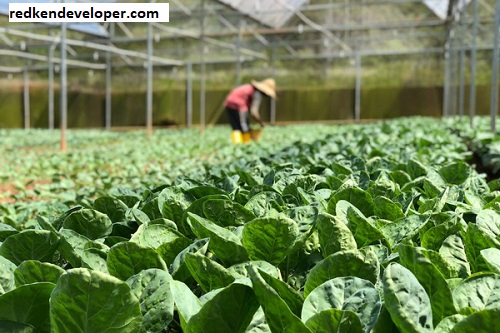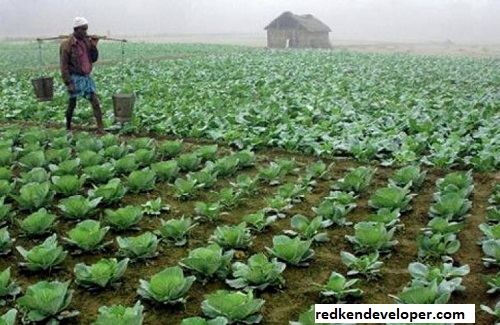The Horticultural Crops Development Authority: Growing Productivity and Developing
Crops Development Authority:
The Horticultural Crops Development Authority plays a critical role in facilitating the development of horticultural crops within various regions. Notably, the authority revolves more around enhancing production and marketing combined with scientific research into horticultural crops. This article details the aims of the authority, its impact on the horticultural industry, and its relevance toward sustainable agriculture.

What is the Horticultural Crops Development Authority?
Crops Development Authority:
It is the government agency that spearheads the promotion and development of horticultural crops. The crops include fruits, vegetables, nuts, mushrooms, herbs, and ornamental plants. The policy instrument of formulating policies, implementing their programs, and providing technical support in the respective horticulture sector to farmers is operated by the HCDA.
Mission and Vision:
The mission of the HCDA is to intensify sustainable horticultural practices to enhance productivity, generate increased income for farmers, and avert food insecurity. Its vision includes a lively horticultural sector to contribute to accelerating economic growth and sustainability in the environment and improved livelihoods.
Functions of the Horticultural Crops Development Authority:
Crops Development Authority:
The functions of HCDA are aimed at achieving its mission and comprise:
1. Research and Development:
This authority conducts research, together with developing new varieties of horticultural crops that are resilient, high-yielding, and resistant to diseases. It collaborates with research and university institutions to carry out experiments and trials for improving cultivation practices.
2. Training and Capacity Building:
Crops Development Authority:
The HCDA also provides training and workshops to empower the farmers’ skills. All these are usually on modern farming techniques, pest management, irrigation practices, and post-harvest handling. Knowledge gained by equipping the farmers will enhance their productivity and quality.
3. Policy Formulation:
The HCDA undertakes important policies in supporting the horticultural sector. This involves developing regulations concerning quality control, market access, and trade facilitation. The HCDA advocates for favorable policies to ensure a conducive environment for horticultural development.
4. Market Development:
To make horticultural crops more marketable, HCDA facilitates farmers’ access to markets. This will be through organizing trade fairs, linking farmers with buyers, and promotion of value addition. The authority also seeks to establish export markets for high-quality horticultural produce.
5. Extension Services:
Crops Development Authority:
By extension services, the HCDA advises farmers on best practice management, optimum crop production, and marketing as well. By visiting the field and holding consultations, extension officers can offer maximum ways to help farmers understand the changes that should be made in solving challenges and optimizing production.
6. Sowing Seeds of Sustainable Practices:
The organization is assured that the agriculture developed is sustainable and reduces impacts on the environment. In this aspect, organic farming, efficient use of water, and integrated pest management are promoted. Through sustainability, the HCDA protects natural resources for use in the future by generations.
The effect of the Horticultural Crops Development Authority
The HCDA’s programs have impacted the horticulture sector as well as its livelihood. Some of the results are as follows:
Crops Development Authority:
1. Increased Production:
Through research and training, the HCDA has an effort to contribute to the increased production of horticultural crops. The farmers who have embraced modern means have responded with better yields and quality crops that translate into better income.
2. Enhanced Food Security:
The HCDA promotes the cultivation of different horticultural crops for food security. A diet that is diversified and supplemented by a variety of fruits and vegetables is fundamental for nutrition and health.
3. Socio-Economic Development:
It supports growth in the horticultural sector, which indirectly benefits the local economies. It absorbs more people in the various production processes-from farming to processing and marketing. More successful export efforts also advance national revenue.
4. Enhanced Farmer Livelihood:
Crops Development Authority:
Farming populations targeted by HCDA schemes tend to enhance their livelihoods. Good returns from horticultural production enable them to either invest in education and better health or improve living conditions for their families.
5. Environmental Sustainability:
HCDA encourages organic farming, which preserves the environment while maximizing resource use. Organic farming and resource maximization help preserve the ecosystem as well as reduce carbon footprints.

Challenges in the Horticultural Sector:
Crops Development Authority:
The horticultural sector, despite its successes, faces several challenges that the HCDA is working to overcome.
1. Climate Change:
Crops Development Authority:
Impacts on Horticultural Production Climate change comes along as a significant threat to horticultural production. Extreme weather, drought, and high temperatures have negative impacts on crop productivity. The HCDA is working on the development of climate-resilient varieties and adaptive practices.
2. Pests and Diseases:
Pests and diseases are huge constraints to crops in horticulture. The HCDA invests in research for developing resistant varieties and integrated pest management practices to control these risks.
3. Market Access:
Farmers lack access to markets because of a lack of infrastructure, information gaps, and competition. HCDA increases market access through partnerships and marketing information for farmers.
4. Low Financial Resources:
Crops Development Authority:
Most smallholder farmers lack access to credit and financial resources for investments in modern farming techniques. This is advocated for by HCDA through financial support and partnerships with financial institutions.
5. Knowledge Gaps:
A knowledge gap on the new-fangled farm practices among the farmers is in existence. There is a need for continuous capacity-building initiatives to develop the skill and information competency of the farmers.
Horticultural Crops Development Authority Future:
Crops Development Authority:
Going into the near future, the HCDA will have much responsibility in shaping the future process of development. The areas involved include:
1. Embracing Technology:
Implementation of technology in horticultural practice will enhance productivity and efficiency. The HCDA seeks to spur precision farming, digital tools, and data-informed farming decisions by the farmer.
2. Collaboration in Research:
Crops Development Authority:
Research institutions, universities, and other private sector players will form part of collaborations to enhance innovation in horticulture practices. The HCDA is keen on building partnerships that grow research and development activities.
3. Scaling Up Market Opportunities
The emerging market opportunities to be harnessed are export markets for niche horticultural products. Branding and marketing strategies will therefore form a significant part of the promotional activities of produce at local levels.
4. Enhancement of Resilience to Climate Change:
Crops Development Authority:
The HCDA continues focusing efforts on developing climate-resilient crop varieties, with additional encouragement of sustainable practices, in facilitating adaptation by farmers to changing climatic conditions.
5. Promotion of Sustainable Development Goals
The projects undertaken by HCDA are directed towards the United Nations’ Sustainable Development Goals such as zero hunger, responsible consumption, and climate action. This will direct future directions and programs.
FAQs:
Crops Development Authority:
1. What is the mission of the Horticultural Crops Development Authority?
The primary mission of HCDA is to ensure the sustainable development of horticultural crop productivity improvement, thereby providing a livelihood for the farmers and ensuring food security.
2. How does the HCDA support farmers?
Crops Development Authority:
The HCDA supports farmers through research and development, training, extension services, market access initiatives, and policy formulation.
3. Do farmers have to qualify under some categories to benefit from these services by the HCDA?
Although the requirements might vary with a specific program, the HCDA generally aims to service all the horticultural farmers among both small-scale and large-scale producers.
4. What crop will HCDA target for intervention?
It addresses almost all horticulture crops like fruits, vegetables, nuts, mushrooms, herbs, and ornamental plants.
5. How do farmers join HCDA training?
Crops Development Authority:
Farmers can join the various HCDA training programs through a local office or community outreach initiatives. Information usually passes through agricultural extension workers.
6. Is HCDA involved in the export promotion of horticultural produce?
Yes, the HCDA actively promotes export opportunities for high-quality horticultural products to connect farmers with markets and assist farmers in meeting international requirements.
7. How is the HCDA involved in responses to challenges posed by climate change?
The HCDA is involved in developing climate-resilient crop varieties, implementing sustainable practices in horticulture, and offering training on adaptive measures to the farmers.

Conclusion:
Crops Development Authority:
The Horticultural Crops Development Authority plays a very important role in enhancing the development of the sector of horticulture, developing farmer skills and competencies, food security, and economic growth. It enables farmers to play competitively and competitively in a changing landscape through training, research, and policy formulation as well as market development. As the authority continues to evolve with the emerging challenges and opportunities, the commitment to sustainable horticultural practices will drive its mission, shining a light for farmers and consumers alike.